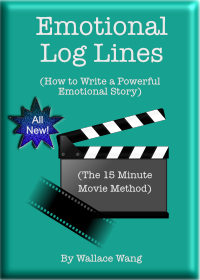Emotional Log Lines (How to Write a Powerful Emotional Story )

Writing a Screenplay Isn’t Easy.
However, professional screenwriters know one trick. The best screenplays aren’t those with the most creative idea, the most action, or the most suspense. The best screenplays are those that create the maximum amount of emotional impact on the audience.
When you write a screenplay, you’re not just telling a story. You’re creating an emotional experience. The stronger this emotional experience, the more appealing your story will be.
Great Screenplays Create Emotional Experiences
How many times have you watched “Star Wars”? If “Terminator 2” appeared on your TV, would you stop to watch all or part of it? Movies like “Titanic”, “Alien”, “The Hunger Games”, “Thelma and Louise”, “Die Hard”, “Harold and Maude”, “The Shawshank Redemption”, “Legally Blonde”, “Rocky”, and “Ghostbusters” grab and hold your attention even though you may already know what happens next. You aren’t just interested in seeing what happens so much as you’re interested in reliving the experience of watching those movies for the way they make you feel.
So if you want to write the a great screenplay, create the most powerful emotional experiences possible. To do that, you need to understand emotional loglines.
You Need an Emotional Logline
You may already know what a logline is, which is a sentence or paragraph that describes what happens in a story. A logline summarizes your entire story without worrying about any specific details.
An emotional logline works the same way except it describes a specific type of emotional experience you want your story to deliver. An emotional logline describes the emotional change in your hero that shapes your hero’s motivation, background, and thinking.
When you know each character’s emotional logline, writing a unified, focused, and emotional story is easy. When you don’t know your character’s emotional logline, you risk creating a disjointed story that fails to deliver a unified and focused emotional experience.
Stories Without Emotional Loglines Are Easily Forgotten
A story without emotion is easily forgotten. A story loaded with emotion can be unforgettable. If you’re going to write a screenplay, shouldn’t you strive to write the most compelling and intriguing screenplay you can?
An emotional logline summarizes the emotional change in your hero. A plot logline summarizes what happens in your story.
You need both a plot logline and an emotional logline so you can tell a great story and make it emotional.
Why Do You Watch the Same Movies Over and Over Again?
Remember why you watch your favorite movies. It’s never about the plot. It’s always about the emotion. By using emotional loglines, you can start writing screenplays to create movies that people will never forget.
